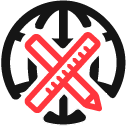One thing that sets job seekers and workers apart from each other is their skill and drive to set and attain career goals. Not everyone knows the value of mindful career goal-setting, so it’s a good idea that you’re reading this blog to get started. Besides, a lot of recruiters ask the job interview question “What are your career goals?” so it’ll only serve you well if you already have clear answers for it. However, goal-setting for your career may not be an easy process as it may seem.
Are you ready to set your professional goals? Let’s discuss the ins and outs of this process without the overwhelm, and how you can use practical steps toward achieving your aspirations.
Defining Career Goals
Career goals are well-written statements defining the role or career path you aim to take or pursue. Simply put, you may look at these goals as targets: They refer to what you have set your mind on achieving, such as certain job positions, scenarios, or anything related to your professional life. Furthermore, career goals can either be short-term or long-term. Based on your overall career plan, you must label each career goal you set so that you have a more detailed guide.
Also, many people treat their career goals as some sort of motivation to help them keep going in their careers. You may also adopt this mindset if you believe having something to look forward to works best for you.
Value of Career Goals
As mentioned earlier, you may experience being asked about your career goals in a job interview. However, that shouldn’t be your main reason why you must prepare your answer. Aside from leaving a good impression to hiring managers or job interviewers, the perks of knowing what you want to achieve in your career also helps you plan out your next steps.
Hence, you can keep your focus and avoid getting stuck on a cycle where things tend to get boring and remove that excitement from you. Getting stuck on this tough cycle may lead to burnout, job dissatisfaction, or getting discouraged to work. Moreover, setting career goals is highly crucial if you want to craft strong action plans. In the course of building your career, you’d want to step up your game and boost your quality of work and living. This entails planning your next steps to achieve your short-term and long-term goals, including those in your personal life as well.
Before you proceed writing your own, check out the following quick guide on the two types of goals you can set.

Short-Term and Long-Term Career Goals: How Do They Differ?
We get you: Labeling your goals might get confusing. Fret not! Learn about their distinctions and short-term and long-term goals examples you can use as reference:
Short-Term Career Goals
Ideally, you can achieve these goals within 6 months to 3 years. Further, these refer to the goals you see as actionable items you can focus on now that can later on help you achieve your long-term goals.
Here are some samples you can use as guide:
- Getting your dream promotion
- Earning a much-needed training to cultivate your skills
- Gaining a new skill
- Boosting your networking skills
- Taking an internship with a large company to gain experience
Long-Term Career Goals
You can reach your goals falling under this type within 3 up to more than 5 years. That said, you’ll need to allot significant time, effort, resources, and mindful planning.
You may take inspiration from these samples:
- Being able to run your own business
- Earning a college degree
- Making a career switch
- Being a thought leader or expert in your chosen field
- Winning an esteemed award in your field
Most Common Career Goals
Now that we’ve discussed the two main types of career goals, you also have to note these four main groups based on their focus.
- Professional Development: Goals under this group pertain to how you intend to improve your work performance and efficiency.
- Leadership Advancement: If you’re the kind of professional who’s interested in a leadership role in the future, the goals you must set under this group should focus on improving your management skills and aiming for roles with more obligations.
- Educational Advancement: Since learning is a lifelong game, you must also set goals focusing on boosting your knowledge base. Under this group, you should assert your efforts on keeping up to date with the new changes in your field and learning new or different things.
- Personal development: The goals falling under this group are those that highlight your self-improvement journey and the skills you need to build your network.

Tips in Setting Career Goals
One proven technique you can use is to set SMART goals. Your career goals must be Specific, Measurable, Attainable, Realistic, and Time-bound. Unsure if you’ve used this technique yet? We’ve got you! Follow these tips:
1. Specific
Strive to set clear goals that are aligned with your definition of success. If your meaning of success remains vague and too broad, this won’t help you craft the proper milestone or goal you want to achieve.
Further, it’s also best for you to own your career goals. This means you must not burden yourself with useless pressure and end up comparing your goals to other’s successes.
2. Measurable
Now that you’ve listed your specific goals, ensure that you can also set guidelines in gauging your actions and results. Having time frames and key indicators are good ways for you to gauge if you’re on the right track. While it’s more than just these numbers, these data help you check if your actions help you achieve your short- and long-term goals day by day.
3. Attainable
At times, we tend to set unreachable goals for various reasons. These include pushing ourselves to our limit. However, such reason can’t help you get closer to reaching your top career goals.
Having that said, make sure you list down those that are aligned to your strengths, skills, and interests. This way, you’d be more fired up as you work on achieving them.
4. Realistic
In relation to the Attainable criterion, being able to set your realistic goals becomes tedious if you tend to overdo it. Instead, take time to think about where you want to be in your career, craft supportive action plans for each goal, and make sure they’re aligned with what you can and are willing to commit. Besides, we all know that all good things take time, effort, and dedication.
5. Time-Bound
To further help you measure your action plans and results, setting deadlines for your career goals is also a great idea. It doesn’t just allow you to prioritize, but also lets you see the bigger picture of your professional development goals and dreams.
In addition, you can have a glimpse of the things you need to do (or sacrifice, based on how grand your goal is) when it comes to your personal life. Of course, there will be an overlap in your decisions as you get more factors at stake.
How to Achieve Career Goals
Such a SMART way to set goals, right? However, here’s the real deal: How do you now ensure you could achieve them?

1. Write them down.
Whether you want to write using pen and paper or the digital way, it’s up to you. What’s important is that you write your career goals down. Also, place your written goals where you can see them easily and more frequently. This is to have something to remind you of what you want to achieve.
2. Work on yourself.
All your planning and goal-setting will be useless if you don’t put in the work needed. To give you an idea, here are some soft skills you can work on based on your chosen field:
- Public speaking
- Leadership skills
- Communication skills
3. Have an accountability partner.
As long as you’re okay with it, find someone you can trust and you think can help push you to reach your goals. Sharing your plans or even the gist of your goals lets you have that sense of urgency when you know someone is aware of them.
4. Manifest your success.
Claim that victory! Imagine your future self, reaping the fruits of your hard work. Make that as your inspiration to go on and turn your career goals into reality.
Fulfill Your Career Goals at FilWeb Asia
Skip the tedious search and let FilWeb Asia, Inc. help you get started toward reaching your short- and long-term goals! Check out our available job openings and see where you fit best.









